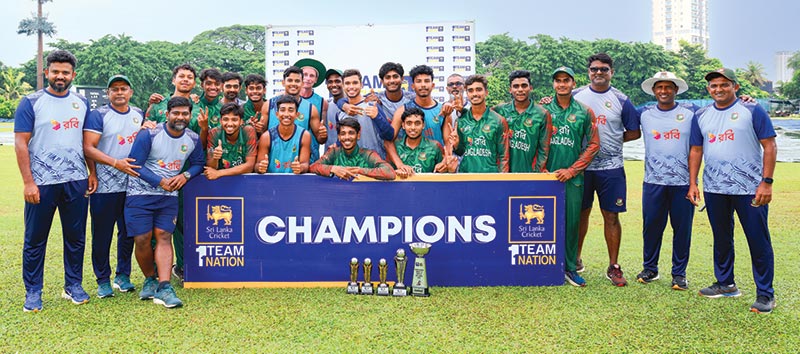Many comments have been made on the subject of whether England should play cricket against Afghanistan while their women are barred from playing at all. Yet few outsiders are as qualified to speak as Dr Sarah Fane. The chair of the MCC Foundation worked in Afghanistan for 20 years and was among the first to organise cricket in the country, thereby helping sow the seed of perhaps the most surprising growth in the history of sport.
After all, Afghanistan have now beaten the country that invented cricket , England. Fane won an OBE for her work in Afghanistan, before Western governments pulled the plug and left the country in the clutches of the Taliban. Her journey started decades earlier, when she decided to follow her GP father into the medical profession.

“Family had a bearing on everything I’ve done in life,” she says. “I went to a village in rural India in my gap year [in 1981]. The head of this water project told me I wasn’t going to change the world but it would change me.
I lived in a mud hut and had to learn Telugu, and as the only other white woman they had seen was a nurse, they came to my mud hut to ask me to deliver their babies. After two terms of French and Latin at Bristol University, a friend said, ‘When are you going to do what you should do and become a doctor?’ I didn’t have a science A-level so it was a lot of hard work.” In the late 1980s she was in Pakistan, where tribesmen in the North-West Frontier Province would have been surprised to see a tall white woman on horseback.
So surprised, in fact, that Fane was forced to dress as a man to work as a doctor for refugee women and children among the Mujahideen, who were fighting the Russian invaders. “The Mujahideen treated me beautifully,” she says. ‘Men wanted their girls to go to school so they could bring in an income’ After returning to the UK and having four children, she went back to Afghanistan in 2001, working in a mother-child clinic in the Panjshir Valley and in hospitals where doctors operated under canvas after the Taliban had bombed them.
Her visit prompted her to found the charity Afghan Connection in 2002. Back then the number of girls going to school in Afghanistan was about 5,000 (no misprint, five thousand). With help from British donors and the Swedish Committee for Afghanistan, she set about building schools, twinning them with schools in the UK and funding teacher training.
“The key was to listen to the communities and one of the important things was to build a wall around these schools so everyone felt safe, and fathers were happy for their girls to attend,” Fane says. “No amount of talk about human rights and female rights was going to change the population, but once men saw women bringing in an income they wanted their girls to go to school. Even in remote areas, we reached the point where the girls were completing their education and going on to university, midwifery schools and teacher training colleges for the very first time.
People wanted schools everywhere.” And Fane founded dozens, to which was added the secret ingredient: cricket pitches. Fane organised her first cricket camp in Afghanistan, in 2009 in Jalalabad, with the aid of MCC funding.
Club member Matthew Fleming, a former England white-ball all-rounder, was there to see it. “It never rains in Jalalabad but on the morning of this camp it deluged and I was in tears,” Fane says. “Then the sun came out and crowds turned up at the university, and so did the entire Afghan team whom I had persuaded to come.
The children, who didn’t even have a pair of shoes, were given cricket kit and met their heroes. From then on our projects took off. It wasn’t just cricket for boys, but the deaf and blind and those with other disabilities, and for girls, who had taught themselves by watching men on TV.
” With support from MCC , the Foreign Office, and generous individuals, they went on to build more than 100 cricket pitches across Afghanistan. Every time they built one, they delivered coaching and allocated funding to the school to upgrade facilities. At the same time, Afghanistan were moving up the International Cricket Council’s divisions, having begun by playing Japan and Jersey.
“Many say those years were wasted,” Fane says about the period up until 2020, when she read the warning signs about the Taliban’s advance and closed her charity down, as these schools had become self-sustainable. “So many young people in Afghanistan wanted to seize the opportunity to rebuild their country, as engineers or doctors or teachers and it is an absolute tragedy what has happened. But millions of children were educated during that time, and you can’t take away that education from them, and as history changes that will re-flower.
Girls will be educating other girls now, even if not in school.” When Fane became chair of the MCC Foundation in 2020, she had a team of three that had been focused on providing free coaching and matchplay for state schools in Britain. Now her team consists appropriately of 11, and this charitable arm of MCC delivers something priceless for tens of thousands of boys and girls around the world, from the UK to Lebanon to Nepal and Rwanda and soon Brazil: self-esteem and joy.
‘Afghan women cannot be silenced’ The foundation has also recently started the Global Refugee Cricket Fund and the first project it will support is Pitch Our Future, which did so much to get Afghan women cricketers to Australia. The ICC has also recently announced a taskforce to coordinate funding, coaching and facilities for displaced Afghan players. “You should always go on the facts you know, and I know for a fact that the former Afghanistan Women players now living in Australia want to play cricket.
If we can support them and keep the flame alive, their refugee team should thrive and some of them will go on to play for Australia or for T20 franchises around the world,” says Fane. “They will be the role models who show that Afghan women cannot be silenced, and that will bring great comfort to Afghan girls. “Since the withdrawal back in 2021 we have no leverage with the Taliban.
But what must be done, and all I can practically do, is to seize this moment when the world seemingly cares greatly about Afghan women and do something to help where I can. Part of that will be our support for the Afghan Refugee Team in Australia, but I am planning much more to use this momentum to truly support Afghan women across the world and other refugees through sport and all we can attach to that in a meaningful way. The moment is now and I am determined.
” Recently Fane flew to Beirut to support another project the MCC Foundation helps to fund. The Alsama Project has taken cricket to Syrian and Palestinian refugees, girls every bit as much as boys, and used it as a bedrock of their education. In the four Alsama schools in Lebanon the pupils who play cricket perform better than their contemporaries who do not: better self-discipline, longer concentration, higher attainment and so on.
Divide and rule was Caesar’s dictum and that of subsequent empires. Deport and rule is becoming the vogue of modern governments. Fane offers an alternative vision: integrate, educate and live.
.
Sports

From mud hut to Mujahideen to MCC: One woman’s incredible journey

Many comments have been made on the subject of whether England should play cricket against Afghanistan while their women are barred from playing at all. Yet few outsiders are as qualified to speak as Dr Sarah Fane.















